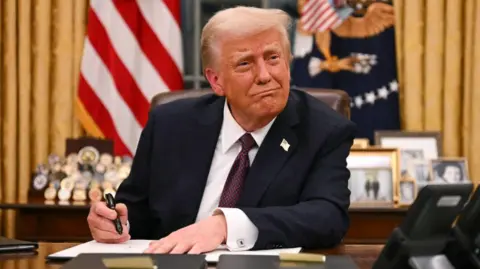On January 20, 2025, amid a whirlwind of executive actions, President Donald Trump signed an executive order that temporarily delays the enforcement of a federal law mandating either the sale or ban of TikTok, a popular social media app. This directive allows TikTok an additional 75 days to negotiate compliance with the legal requirements that have been under scrutiny since 2020, when the previous administration attempted to impose similar restrictions due to national security concerns. Trump’s recent shift in stance comes at a time when he claims that many wealthy individuals have consulted him regarding TikTok’s future.
In the wake of the signing, Trump faced questions about his changing position on TikTok after previously supporting a ban during his first term. His response was casual and revealing, mentioning, “Because I got to use it,” implying that his personal engagement with the platform has shifted his perspective. These statements raise questions about the influence of personal usage on policy decisions, highlighting the complexities that surround political leadership and digital media engagement.
The timing of Trump’s executive order was significant, arriving just after TikTok’s parent company, ByteDance, faced operational difficulties in the U.S. Following a law that went into effect over the weekend, TikTok was unavailable to American users due to national security legislation upheld by the Supreme Court. The stringent regulations led to a temporary service halt; however, following the executive order from Trump, TikTok resumed operations for its 170 million users in the United States. This swift turnaround suggests the considerable influence the executive office holds over digital platforms and the immediacy of policy changes in the digital realm.
Historically, Trump’s administration had been critical of TikTok, deeming it a potential security threat due to its Chinese ownership. During his initial term, attempts were made to restrict the app significantly, creating a polarized environment surrounding its usage. However, the dynamics seem to have shifted, especially with TikTok’s Chief Executive Officer, Shou Zi Chew, attending Trump’s inauguration alongside other tech titans, such as Elon Musk, Mark Zuckerberg, and Jeff Bezos. The presence of high-profile industry leaders indicates the evolving relationship between politics and technology.
On a lighter note, the announcement coincided with prominent social media activity, as popular YouTuber Mr. Beast posted a TikTok video allegedly from a private jet, hinting at plans to make a significant offer to acquire the platform. While he gave few details about this proposal, the notion that influencers and celebrities could engage in negotiations for a major app illustrates the platform’s cultural and economic weight in contemporary society. Other notable figures, including Musk and investor Kevin O’Leary from the TV show Shark Tank, have also expressed interest in potentially acquiring TikTok, showcasing the competitive landscape surrounding the future of this social media giant.
As the debate around TikTok continues, the implications of Trump’s decision and the interests of tech moguls set the stage for intriguing developments in the future. Users, policy-makers, and industry stakeholders alike will be closely monitoring how this 75-day reprieve will unfold, and whether significant structural changes will occur within TikTok’s operational framework as it navigates the contrasting pressures of regulation and entrepreneurial interest. The convergence of these factors underscores a new chapter in the nexus of politics, technology, and user engagement as the digital landscape shapes and is shaped by the socio-economic powers at play.



